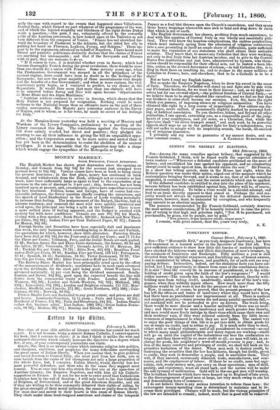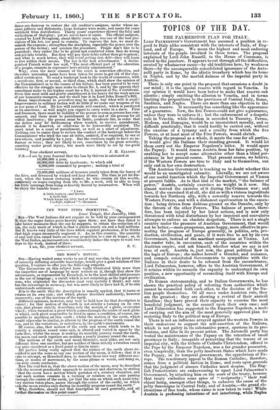INSOLVENCY REFORM. ,
Cannon Street, February 1, 1860. Sea—The " Mercantile Evil," as you truly designate Insolvency, has been well examined in a learned notice in the Spectator of the 21st ult. You give sufficient evidence to show how little the fancies of modern legislation have checked the hideous waste and illicit distribution of men's treasure, by the misdeeds of Insolvents and Bankrupts. Fifty millions a year is still diverted from the rightful enjoyment, and fructifying use, of honest owners, and is annihilated by idlers, rogues, and gamblers,. for of such sort are non- paying debtors. Instructive, indeed, are the statistical facts you have col- lected, but I beg opportunity to diligent from some of the conclusions drawn. It is said "Does the remedy lie in increase of punishment, or in the with- holding of credit given upon the faith of the law's vengeance ?" I would rather answer—The remedy lies in increase of punishment, thereby with- holding men from taking credit, unadvisedly, under fear of the law's ven- geance, when they wilfully injure others. How much more than the fifty millions would be lost were it not for the pressure of the law ? Now, it cannot, of course, be proved, that the present pressure of the law has left the offences and losses of insolvency where they would have been, had there been no punishment nor imprisonment at all. There is medical and surgical practice,—many persona the and many painful operations fail,— yet mankind will not be persuaded to give up doctors. The truth being, there would be more disease and a heavier mortality if there was no medi- cine ; and there would be more insolvency and much greater loos thereby, and men would more freely indulge in those vices which cause their own and their creditors' ruin, if they were relieved entirely from the little incon- veniences of imprisonment to which they are now liable. The easiest way to enjoy the good things of this life is to get into debt, to obtain goods for use or resale on credit, and to refuse to pay. It is much safer than to steal, either with or without violence • and if all punishment be removed—an end to which many small philanthropists and many rogues are working—credit will go on until the capital of the industrious can bear the confiscation no longer, and then there will be no more credit at all; no man will take, in ex- change for goods, his neighbour's word-of-mouth promise to pay ; and, in lieu of the many comforts and privileges of credit, we shall fall back on the primitive barbarism of the desert. When men seek to destroy credit, by destroying the securities that the law has hitherto, though but feebly, given„ to credit, they seek to demoralize a people, and to uncivilize them. They will, if they succeed, enormously diminish trade, manufactures, and com- merce, and the employment of labour, If there be no credit, none but capi- talists, rich, ready-money men, can carry on these operations ; men of skill, probity, and experience, must all stand back, and the nation will be under the sole tyranny of millionaires. Gold will be the one god men will worship. The leviathan fortunes which have been heaped up in England of late years, to the discouragement of good men at large, are very much owing to our lax and demoralizing laws of commerce. I do not believe there is any serious intention to reform these laws : the extravagant money-spending class is determined to maintain and to in- crease their privileges. Changes will be made, but the vicious principles of the law are intended to remain ; indeed, much that is good will be removed. Some are desirous to restore the old creditor's assignee, under whose an- cient jobbery and dishonesty, large fortunes were made, and assets for years withheld from distribution. Thirty years' experience showed the folly and wickedness of that plan ; yet we are to have it again. The official assignee, created by Lord Brougham, about thirty years ago, was one of the best pro- visions of his Act, too good to retnaiu. To improve the law, we must di- minish the expense ; strengthen the discipline, especially the power over the person of the debtor; and quicken the procedure. People don't like to be punished ; they rather like to be pitied and comforted when they do wrong and get into trouble. But they will pay their debts rather than go to prison; and what is much better, they will avoid getting into debt—they will learn to live within their means. The law is the best schoolmaster. A distin- guished French writer has said, " The most efficient part of the education of a people, consists in repressive laws strictly administered." Why, even the mere censure of the court is somewhat effective, and therefore unceasing pains have been taken for years to get rid of the clas- sified certificates. To send a bankrupt back to the world of commerce,. with a certificate, first, or second, or third class, which shall show the opinion of the Commissioner as to the causes of his failure, has been proved to be very effective by the struggle men make to obtain No. 1, and by the appeals they sometimes make to the higher court for a No. 2, instead of No. 3 certificate. Even this most mild and gentle punishment is too heavy for the weak nerves of our humanity-mongers, and we shall lose it in Lord John Russell's Bill. Some improvement in procedure may be made, but what will it avail ? Improvement in military tactics will do little if we make our weapons of tin or our guns of lead. No law will restrain evil conduct, which is paralyzed in its sanctions : as well might you expect to carry water in a sieve. First and foremost, there must be liability of the person as soon as process has com- menced, and there must be punishment at the end of the process for all wilful insolvency ; the person must be liable, pendente lite, in order that the debtor may be forthcoming when wanted, to receive punishment, should it be deserved, or otherwise to be honourably acquitted. The court must be a court of punishment, as well as a court of adjustment. Nothing can be easier than to review the conduct of the bankrupt before the Commissioner who tried the case ab initio, assisted, if so required, by one or two: others, and possibly by ajury. But the creditors ought to have no in- fluence or voice ; they . are likely to err, sometimes by too great severity, smarting under great injury, but much more likely to err by too great leniency.
P.S.—I see by your Journal that the loss by thieves is estimated at 16,000,000 a year, 50,000,000 ditto by insolvents ; to which add 6,000,000 consumed by paupers ; making a total of 72,000,000 millions of treasure yearly taken from the honey of the hive, and devoured by wicked and lazy drones. The time is yet far dis- tant when the honest enduring worker, he who creates all this wealth, only on wages ranging from 10s. to 20s. a week, will be able to keep . Lis ittle earnings from being so heavily fleeced by maurauders. When will ha joy the htimble boast-
" I have
A little buttery, and therein
A little bin, m keeps dy little loaf of bread Unchipt, unflead" 7—HEnntex.































 Previous page
Previous page